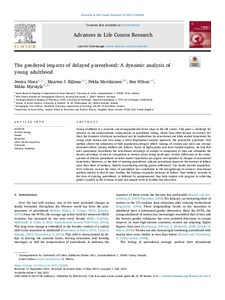The gendered impacts of delayed parenthood: A dynamic analysis of young adulthood
Nisén Jessica; Martikainen Pekka; Wilson Ben; Myrskylä Mikko; Bijlsma Maarten J.
https://urn.fi/URN:NBN:fi-fe2022081154947
Tiivistelmä
Young adulthood is a dynamic and demographically dense stage in the life course. This poses a challenge for research on the socioeconomic consequences of parenthood timing, which most often focuses on women. We chart the dynamics of delayed parenthood and its implications for educational and labor market trajectories for young adult women and men using a novel longitudinal analysis approach, the parametric g-formula. This method allows the estimation of both population-averaged effects (among all women and men) and average treatment effects (among mothers and fathers). Based on high-quality data from Finnish registers, we find that later parenthood exacerbates the educational advantage of women in comparison to men and attenuates the income advantage of men in comparison to women across young adult ages. Gender differences in the consequences of delayed parenthood on labor market trajectories are largely not explained by changes in educational trajectories. Moreover, at the time of entering parenthood, delayed parenthood improves the incomes of fathers more than those of mothers, thereby exacerbating existing gender differences. The results provide population-level evidence on how the delay of parenthood has contributed to the strengthening of women’s educational position relative to that of men. Further, the findings on greater increases in fathers’ than mothers’ incomes at the time of entering parenthood, as followed by postponement, may help explain why progress in achieving gender equality in the division of paid and unpaid work in families has been slow.
Kokoelmat
- Rinnakkaistallenteet [19207]
